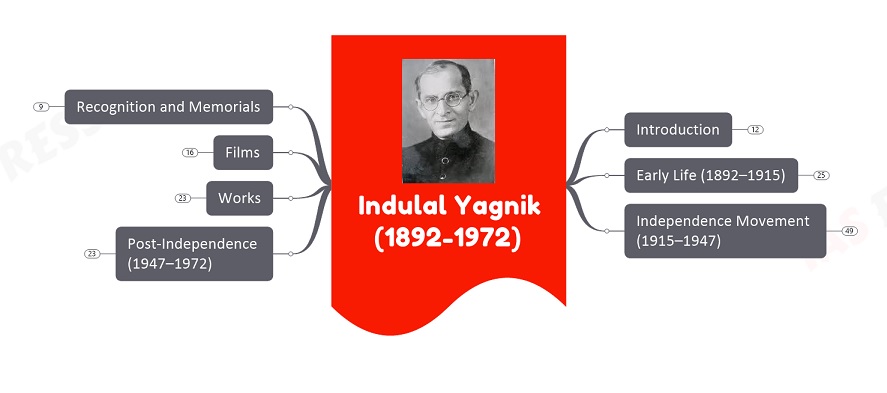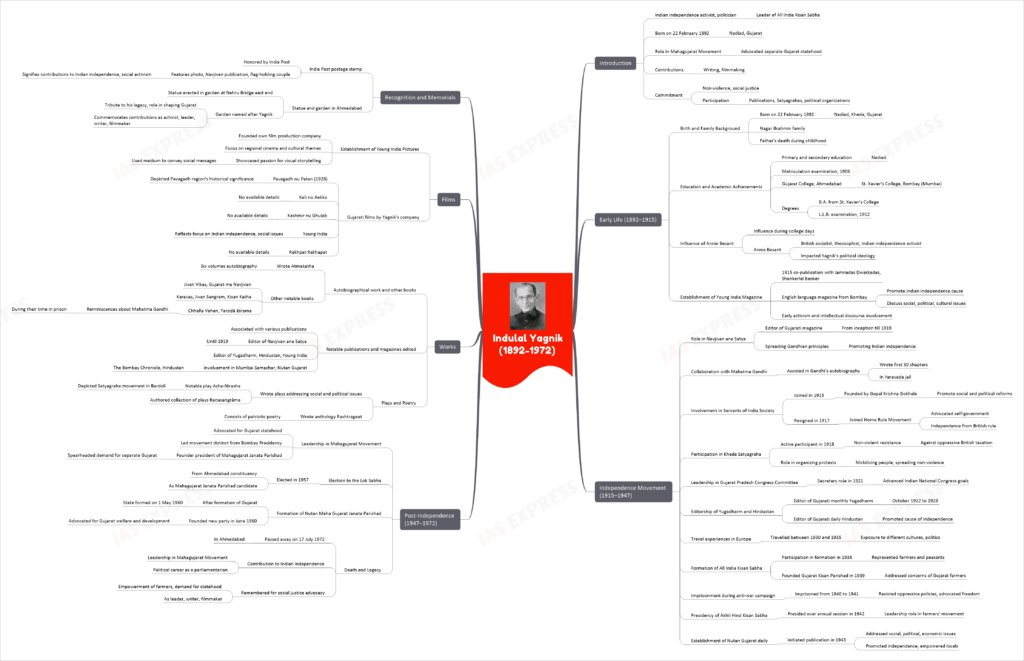Indulal Yagnik (1892-1972): The Voice of Farmers and Freedom Fighters

I. Introduction
Indulal Kanaiyalal Yagnik, also known as Indu Chacha, was a prominent Indian independence activist, politician, and leader of the All India Kisan Sabha. Born on 22 February 1892 in Nadiad, Gujarat, Yagnik played a pivotal role in the Mahagujarat Movement, advocating for the separate statehood of Gujarat. His contributions spanned across various fields, including writing and filmmaking. With a steadfast commitment to non-violence and social justice, Yagnik’s journey unfolded through his involvement in publications, participation in Satyagrahas, and leadership in political organizations, leaving a lasting impact on the struggle for independence and the shaping of modern Gujarat.
II. Early Life (1892–1915)
A. Birth and Family Background
- Indulal Kanaiyalal Yagnik was born on 22 February 1892 in Nadiad, Kheda, Gujarat.
- Belonged to a Nagar Brahmin family.
- His father, Kanaiyalal, passed away when Indulal was young.
- Details about his immediate family members are not available.
B. Education and Academic Achievements
- Completed primary and secondary education in Nadiad.
- Passed the matriculation examination in 1906.
- Joined Gujarat College in Ahmedabad for further studies.
- Pursued higher education at St. Xavier’s College in Bombay (now Mumbai).
- Obtained a B.A. degree from St. Xavier’s College.
- Completed his L.L.B. examination in 1912.
C. Influence of Annie Besant
- Indulal Yagnik was deeply influenced by Annie Besant during his college days.
- Annie Besant was a prominent British socialist, theosophist, and Indian independence activist.
- Her ideas and philosophies had a lasting impact on Yagnik’s political ideology.
D. Establishment of Young India Magazine
- In 1915, along with Jamnadas Dwarkadas and Shankerlal Banker, Yagnik co-published the English language magazine “Young India” from Bombay.
- Young India aimed to provide a platform for spreading ideas and promoting the cause of Indian independence.
- The magazine served as a medium for discussing social, political, and cultural issues of the time.
- Indulal Yagnik’s involvement in the publication marked his early foray into the world of activism and intellectual discourse.
III. Independence Movement (1915–1947)
A. Role in the publication of Navjivan ane Satya:
- Indulal Yagnik served as the editor of the Gujarati monthly magazine Navjivan ane Satya from its inception until 1919.
- The magazine provided a platform for spreading Gandhian principles and promoting the cause of Indian independence.
- Yagnik’s involvement in the publication showcased his dedication to disseminating ideas of truth, non-violence, and social justice.
B. Collaboration with Mahatma Gandhi and writing his autobiography:
- Indulal Yagnik collaborated closely with Mahatma Gandhi, taking dictation and writing the first 30 chapters of Gandhi’s autobiography in Yeravada jail.
- This collaborative effort led to the creation of one of Gandhi’s most famous works, which showcased his life, struggles, and philosophies.
C. Involvement in the Servants of India Society and Home Rule Movement:
- Yagnik joined the Servants of India Society in 1915, an organization founded by Gopal Krishna Gokhale to promote social and political reforms in India.
- However, Yagnik resigned from the society in 1917 and joined the Home Rule Movement, which advocated for self-government and independence from British rule.
D. Participation in the Kheda Satyagraha and other non-violent protests:
- In 1918, Indulal Yagnik actively participated in the Kheda Satyagraha, a non-violent resistance movement led by Mahatma Gandhi against the British government’s oppressive taxation policies.
- He played a crucial role in organizing protests, mobilizing people, and spreading the message of non-violent resistance.
- Yagnik’s involvement in various non-violent protests showcased his commitment to civil disobedience as a means to achieve independence.
E. Leadership in the Gujarat Pradesh Congress Committee:
- In 1921, Indulal Yagnik assumed the role of secretary in the Gujarat Pradesh Congress Committee.
- As a leader in the committee, he worked towards advancing the goals of the Indian National Congress in the region.
F. Editorship of Yugadharm and Hindustan publications:
- From October 1922 to 1928, Yagnik served as the editor of the Gujarati monthly Yugadharm.
- During this time, he also worked as the editor of the Gujarati daily Hindustan from Bombay.
- Through his editorial roles, Yagnik contributed to the dissemination of nationalist ideas and promoted the cause of independence.
G. Travel experiences in Europe:
- Between 1930 and 1935, Indulal Yagnik embarked on a series of travels to various European countries.
- These travels exposed him to different cultures, political systems, and social movements, enriching his understanding of global issues.
H. Formation of the All India Kisan Sabha and Gujarat Kisan Parishad:
- In 1936, Yagnik actively participated in the formation of the All India Kisan Sabha, an organization representing the interests of farmers and peasants.
- He later founded the Gujarat Kisan Parishad in 1939, focusing specifically on addressing the concerns of farmers in Gujarat.
I. Imprisonment during anti-war campaign:
- Yagnik faced imprisonment from 1940 to 1941 for his involvement in anti-war campaigns against British colonial rule.
- His imprisonment symbolized his commitment to resisting oppressive policies and advocating for freedom.
J. Presidency of the annual session of the Akhil Hind Kisan Sabha:
- In 1942, Indulal Yagnik presided over the annual session of the Akhil Hind Kisan Sabha, further solidifying his position as a leader in the farmers’ movement.
K. Establishment of Nutan Gujarat daily:
- In 1943, Yagnik initiated the publication of the Gujarati daily newspaper Nutan Gujarat.
- The newspaper provided a platform to address social, political, and economic issues, promoting the cause of independence and empowering the local population.
IV. Post-Independence (1947–1972)
A. Leadership in the Mahagujarat Movement and formation of Mahagujarat Janata Parishad:
- Indulal Yagnik played a pivotal role in the Mahagujarat Movement, advocating for the creation of a separate statehood for Gujarat.
- He led the movement, which aimed to establish Gujarat as an independent state, distinct from the Bombay Presidency.
- As a prominent leader, Yagnik became the founder president of the Mahagujarat Janata Parishad, an organization that spearheaded the demand for a separate Gujarat.
B. Election to the Lok Sabha as a Mahagujarat Janata Parishad candidate:
- In 1957, Indulal Yagnik was elected to the 2nd Lok Sabha from the Ahmedabad constituency as a candidate representing the Mahagujarat Janata Parishad.
- This election marked his successful political journey and demonstrated the support he garnered for his role in the Mahagujarat Movement.
C. Formation of the Nutan Maha Gujarat Janata Parishad:
- After the formation of the Gujarat state on 1 May 1960, the Mahagujarat Janata Parishad was dissolved.
- In June 1960, Yagnik founded the Nutan Maha Gujarat Janata Parishad as a new political party.
- Through this party, he continued to advocate for the welfare and development of Gujarat.
D. Death and Legacy:
- Indulal Yagnik passed away on 17 July 1972 in Ahmedabad, leaving behind a remarkable legacy.
- His contributions to the Indian independence movement, leadership in the Mahagujarat Movement, and political career as a parliamentarian have left an indelible mark on the history of Gujarat.
- Yagnik’s unwavering commitment to social justice, empowerment of farmers, and the demand for separate statehood continues to inspire generations.
- He is remembered as a dedicated leader, writer, and filmmaker who played a significant role in shaping the political and social landscape of Gujarat.
V. Works
A. Autobiographical work Atmakatha and other books:
- Indulal Yagnik’s most notable work in Gujarati language is his autobiographical work, Atmakatha (Gujarati: આત્મકથા), which spans across six volumes.
- The book provides a detailed account of his life, experiences, and contributions to the independence movement and political activism.
- Other notable books written by Yagnik include Jivan Vikas (Development of Life), Gujarat ma Navjivan (New Life in Gujarat), Karavas (Imprisonment), Jivan Sangram (Life’s Struggle), Kisan Katha (Peasant Stories), and Chhella Vahen (Last Streams).
- Yagnik also wrote Yaroḍā āśrama: 1923–24 na Gandhiji na Karavas na Sansmarano (Reminiscences about Mahatma Gandhi during his imprisonment in Yeravada Jail) in 1952, providing insights into his interactions with Gandhi during their time in prison.
B. Notable publications and magazines edited:
- Indulal Yagnik was associated with various publications throughout his career.
- He served as the editor of Navjivan ane Satya, a Gujarati monthly magazine, until 1919.
- Yagnik’s editorship extended to publications like Yugadharm (a Gujarati monthly), Hindustan (a Gujarati daily from Bombay), and Young India (an English language magazine).
- He also had involvement in newspapers such as Mumbai Samachar, Nutan Gujarat, The Bombay Chronicle, and Hindustan.
C. Plays and Poetry:
- Yagnik ventured into the world of theater with plays that addressed social and political issues.
- One of his notable plays is Asha-Nirasha, which depicted the Satyagraha movement in Bardoli, Gujarat.
- He also authored a collection of three plays titled Raṇasaṅgrāma.
- Yagnik’s contributions to poetry include the anthology Rashtrageet, which consists of patriotic poetry that resonated with the spirit of independence and national pride.
VI. Films
A. Establishment of Young India Pictures:
- Indulal Yagnik established his own film production company called Young India Pictures.
- The company was dedicated to producing films with a focus on promoting regional cinema and cultural themes.
- Yagnik’s foray into filmmaking showcased his passion for visual storytelling and his desire to use this medium to convey messages of social significance.
B. Gujarati films produced by Indulal Yagnik’s company:
- Pavagadh nu Patan (1928): A Gujarati film that depicted the historical and cultural significance of the Pavagadh region.
- Kali no Aekko: Details about this film are not available.
- Kashmir nu Ghulab: Details about this film are not available.
- Young India: A film produced by Young India Pictures, reflecting Yagnik’s commitment to portraying stories with a focus on Indian independence and social issues.
- Rakhpat Rakhapat: Details about this film are not available.
VII. Recognition and Memorials
A. India Post postage stamp:
- Indulal Yagnik was honored by India Post with a postage stamp.
- The stamp features his photo along with his publication Navjivan and a couple holding the flag in the background.
- This recognition by India Post signifies the significant contributions and impact of Yagnik in the context of Indian independence and social activism.
B. Statue and garden dedicated to Indulal Yagnik in Ahmedabad:
- In Ahmedabad, a statue of Indulal Yagnik has been erected in a garden at the east end of Nehru Bridge.
- The garden itself has been named after him, serving as a tribute to his legacy and the role he played in shaping the city and the state of Gujarat.
- The statue and garden stand as a permanent memorial to commemorate Yagnik’s contributions as an independence activist, leader, writer, and filmmaker.
VIII. Conclusion
Indulal Kanaiyalal Yagnik’s life and contributions encompassed various facets of the Indian independence movement and the socio-political landscape of Gujarat. From his early activism and collaboration with Mahatma Gandhi to his leadership in the Mahagujarat Movement, Yagnik’s unwavering commitment to social justice and his efforts to establish Gujarat as a separate state left an indelible mark on history. Through his writings, publications, and films, he promoted cultural identity, non-violence, and the empowerment of farmers. The recognition bestowed upon him, including a postage stamp and a dedicated statue in Ahmedabad, stands as a testament to his enduring legacy as a revered leader and a torchbearer of Gujarat’s rich history.


